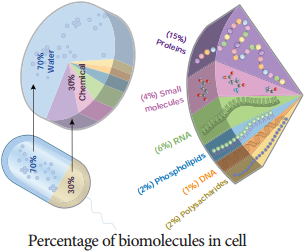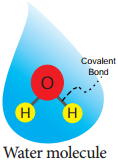Learninsta presents the core concepts of Biology with high-quality research papers and topical review articles.
Water Importance and its Properties
Water is the most abundant component in living organisms. Life on earth is inevitably linked to water. Water makes up 70% of human cell and upto 95% of mass of a plant cell (Figure 8.2).

Chemistry of Water
Water is a tiny polar molecule that can readily pass through membranes. Two electronegative atoms of oxygen share a hydrogen bonds of two water molecule. Thus, they can stick together by cohesion and results in lattice formation (Figure 8.3).

Properties of Water
- Adhesion and Cohesion Property
- High Latent Heat of Vaporisation
- High Melting and Boiling Point
- Universal Solvent
- Specific Heat Capacity
Water is very important to the human body. Every one of your cells, organs and tissues use water to help with temperature regulation, keeping hydrated and maintaining bodily functions. In addition, water acts as a lubricant and cushions your joints. Drinking water is great for your overall health.
Our bodies use water in all the cells, organs, and tissues, to help regulate body temperature and maintain other bodily functions. Because our bodies lose water through breathing, sweating, and digestion, it’s crucial to rehydrate and replace water by drinking fluids and eating foods that contain water.
Your body uses water to sweat, urinate, and have bowel movements. Sweat regulates body temperature when you’re exercising or in warm temperatures. You need water to replenish the lost fluid from sweat. You also need enough water in your system to have healthy stool and avoid constipation.
Uses of Water
- For Drinking
- For Cleaning Dishes
- For Cooking
- For Watering Plants
- For Washing Clothes
- For Bathing
- For Generation of Hydroelectricity
- For Washing Car
It is said that too much consumption of water can lead to fluid overload in the body and imbalance in the body. Excess water can lead to lower sodium levels in the body, which may further lead to nausea, vomiting, cramps, fatigue, etal. This condition is known as hyponatremia.
It’s important to drink enough water during the day, however, it can be disruptive if you drink directly before bed. Avoid drinking water or any other fluids at least two hours before sleeping to prevent waking up at night.
Water helps your kidneys remove waste from your blood. If you don’t get enough water, that waste – along with acids – can build up. That can lead to your kidneys getting clogged up with proteins called myoglobin. Dehydration can also lead to kidney stones and urinary tract infections.
Eliminating food and water intake for a significant period of time is also known as starvation. Your body can be subject to starvation after a day or two without food or water. At that time, the body starts functioning differently to reduce the amount of energy it burns. Eventually, starvation leads to death.